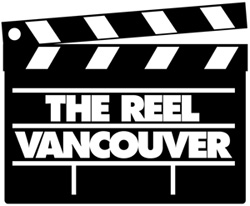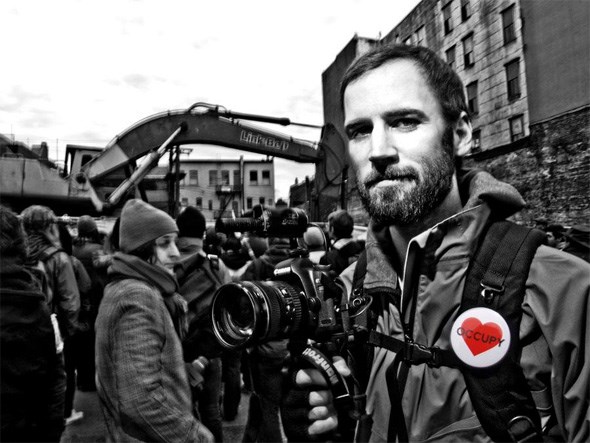 |
Hometown: Port Moody, British Columbia |
We skyped last weekend to discuss his breakout film, the Occupy movement, and how the boy who wanted on Survivor became a force to be reckoned with in the Vancouver film community...

Photo: Jonathon Dy
How did you get into documentary filmmaking?
Well, I had always had an interest in film but it was more fictional film, having written a lot of short stories in the past. When I went to Simon Fraser’s theater and film program it was a little more... avante garde than I was looking for, I wanted to know how to make a film for the industry. I was probably generalizing but it wasn’t the thread of film I wanted, so I started taking communication and they offered some documentary theory courses that I came to really enjoy. When I graduated I ended up continuing in web development, and it wasn’t until One Week Job* presented itself and Sean said, “Dude, you have to film this!” that I quit my job, I had just started Brave New Traveler (an online magazine geared towards spiritual travel) and went on the road with Sean. Since then I haven’t stopped making films in some capacity.
One Week Job was released in 2010 and sold to the CBC documentary channel
What is your favorite part of being a filmmaker in Vancouver?
I think Vancouver is a really interesting, creative place. There’s a lot of crossover communities that produce a really cool, creative mix. We have the tech community, which includes the people who created Flickr, and Electronic Arts, but also the film industry infuses the city with an artistic vibe. At the same time, we have a huge Burning Man community and an underground electronic dance culture, so there’s a lot of opportunity to use film to meet a lot of really interesting people and help them further their projects. For instance, last year I did a short about the Burning Man regional crew who were putting together an art piece for the festival. I put that together and they used it for their Kickstarter campaign, which helped them get the money they needed to get their project out. So that was a great way just to meet that crew and work on something that helped another creative project.
Do you feel that Vancouver has influenced you at all as an artist?
Yes. From an environmental - but not environmentalist - slant. I don’t make straightforward environmental films, but because the city is sort of out of the way, being out west, we’re far away from places like Toronto and I think the culture out here is very different. We have a spacious, environmental consciousness (without producing specifically environmental films), whereas, and I go back to Toronto, I think is more geared towards an urban consciousness, and they deal with the edge between humans and the city. I don’t think Vancouver filmmakers make films about the city, they use it as a backdrop and it’s infused, but it’s different than that urban feel you get from other places.
Did One Week Job [a project that focused on Sean finding his passion] lead you to finding your passion in documentary film?
It’s one of those things, I think a lot of people know deep down what they want to do. Maybe not, but everyone knows what they don’t want to do, and that doesn’t mean that they’ll never know, it just means that, in our culture, we don’t provide a direction for people to find what they want to do because we keep getting pushed along the system. You have to get good grades in high school so you can get into a good school, then you go straight into university and you have to get a job after university and you have to work hard so you don’t lose your job. If you do know, though, and the opportunity comes along, then it becomes easy to take it. In that sense, I knew that I liked filmmaking, I didn’t realize that I’d get to come back to filmmaking besides as a hobby, and it wasn’t until OWJ that I saw my out. I knew I didn’t like my job, but getting into film was definitely a leap, I’m not saying it was easy. We were on the road, doing {One Week Job} and there’s no money, there was no money, so I had to make websites from the road while we were shooting to pay for production and keep up with the bills back home. But if you know underneath all the anxiety of trying to get by in society and pay the bills, if an opportunity comes along, you know that you’re supposed to take it.
When did you feel you officially became a filmmaker, and not just a guy who made films as a hobby?
You know, my friend asked me the other day what I consider myself, professionally. And in some ways, I don’t feel like a filmmaker in the way that I see filmmakers. It’s like when you’re in grade four and you look at kids in grade seven and you’re like, “Aw, I can’t wait to be in grade seven, look how grown up they are...” And then when you actually get to grade seven it’s nothing like what you’d imagine, not in a bad way, it’s just that the mental projection of what you think something is, doesn’t match up. I don’t think I match up to this idea I had of filmmakers before I started doing it professionally. I don’t see myself in my mind’s eye as that projection. So when people ask me what I am, professionally, I think of myself more as an artist, and film is my medium. I found the hardest thing was finding my voice, and every artist goes through those stages, and they take a long time, there’s a lot of imitation along the way. But I think that’s a good way to learn, you look at someone who’s work you really like and you emulate them. Like a writer will start reading a lot of one author and I used to do this with Stephen King, I’d read a bunch of Stephen King and then write something and it would be 60% Stephen King. If I could pin point the moment when I feel I transitioned from imitation to at least a start of my own style, I would say it didn’t happen until last year when I completed the short film on Burning Man and the Temple of Transition. And so that took, if you think of it in terms of I started in 2007, then it took four years to get here, and I think that’s pretty typical. A lot of artists need that time to experience and make whatever it is they’re making before they begin to emerge from their work.
You’ve done a lot of work with the Occupy movement, how do you feel film has escalated protest movements like this?
I’d say that film plays two important roles in movements, there is the actual chronicling of the movement, which is the more raw footage of an event. When there is a big march or rally and different people from different perspectives release footage. This is important because it’s getting the information out there which is great when our mainstream media is so specific about what they share and tell us that we need other outlets and other perspectives on what’s going on. The other level, or purpose of film, is for filmmakers who are crafting something about the movement. That’s what my role has been (and still is). I look at it as you sort of reflect qualities of the movement back at the movement itself. In some sense, the people involved can see something new about themselves that they didn’t necessarily know was there in the first place, or maybe what they’re doing. Somebody involved might say, “We’re demanding accountability from the banks,” and they may think that’s all they’re doing, but then a piece comes out like the one I did called Love and Shadows which was an interview with Michael Stone, a yogi out of Toronto. He talked about this movement being the creation of space in our city and our consciousness to allow that which we have repressed to come back, and that adds a different take on what it is and the movement itself can see itself differently. Reflect and catalyze is what Velcrow {Ripper} and I have called it. In some sense, it should challenge the movement to take it to the next level, and these videos are as much for the people in the movement as it is for people on the outside unsure of whether or not they’re onboard. There was a comment left on the Revolution is Love video saying that the person didn’t understand it at all, but after watching the video they’re right in there with Occupy London. There’s a bunch of variations of those types of comments and a lot of people have been saying that this is what they were feeling but they didn’t know how to articulate it, and that articulated feeling allowed them to understand why they felt drawn to the movement and from there they could go further with it. So, there’s two jobs of film, the chronicling, and then there’s the reflection and catalyzing, which allows the movement to see itself differently.
What’s it like working with a veteran like Velcrow Ripper?
It’s great in that Velcrow is a super interesting dude, he’s done so much and he knows every interesting person you can think of, particularly in the spiritual and activist movement. But in terms of actual tips, for filmmaking, he’s been invaluable in many respects. I can think of a time we were filming in the tar sands in Alberta and there was an indigenous peace walk around the tar sands. So we’re shooting and to get a better shot we crossed the street where these policemen were patrolling. So we get to the other side and these policemen start yelling at us to get back to the other side, and it quickly became a bit of a confrontation, so me, my instinct is to stop filming because if somebody is upset with what you’re doing, then stop and defuse the situation. So Velcrow exchanges a few words with them, and we as reporters have a right to cover an event without being inhibited by the authorities, but by then I had put my camera down and afterwards Velcrow came up to me and said, “Don’t ever stop filming, often the most important moments are going to happen during confrontation.” for me, that was invaluable and that was just a few hours into our first shoot together, and it just comes from years of experience.
What’s next for you?
In the short term we’re finishing Occupy Love, and that will hopefully be a defining film of the occupy movement, but also the paradigm shift happening around the world, so that’s the large scale, but I also have a few other pieces in the works. The Sacred Economics long form with Charles Eisenstein should be out in the next few weeks, and I’m in talks to go to Japan with Michael Stone, the yogi, to make a short about the Fukishima nuclear disaster. He’s written a book using the disaster as a microcosm of our time and the challenges we’re dealing with and it’s part memoir so hopefully that goes through.
http://www.youtube.com/watch?v=BRtc-k6dhgs
If you’d like to see any of Ian’s videos check out his website and please donate to the Occupy Love project he and Velcrow have spent a lot of time and money producing at www.indiegogo.com/occupy-love


